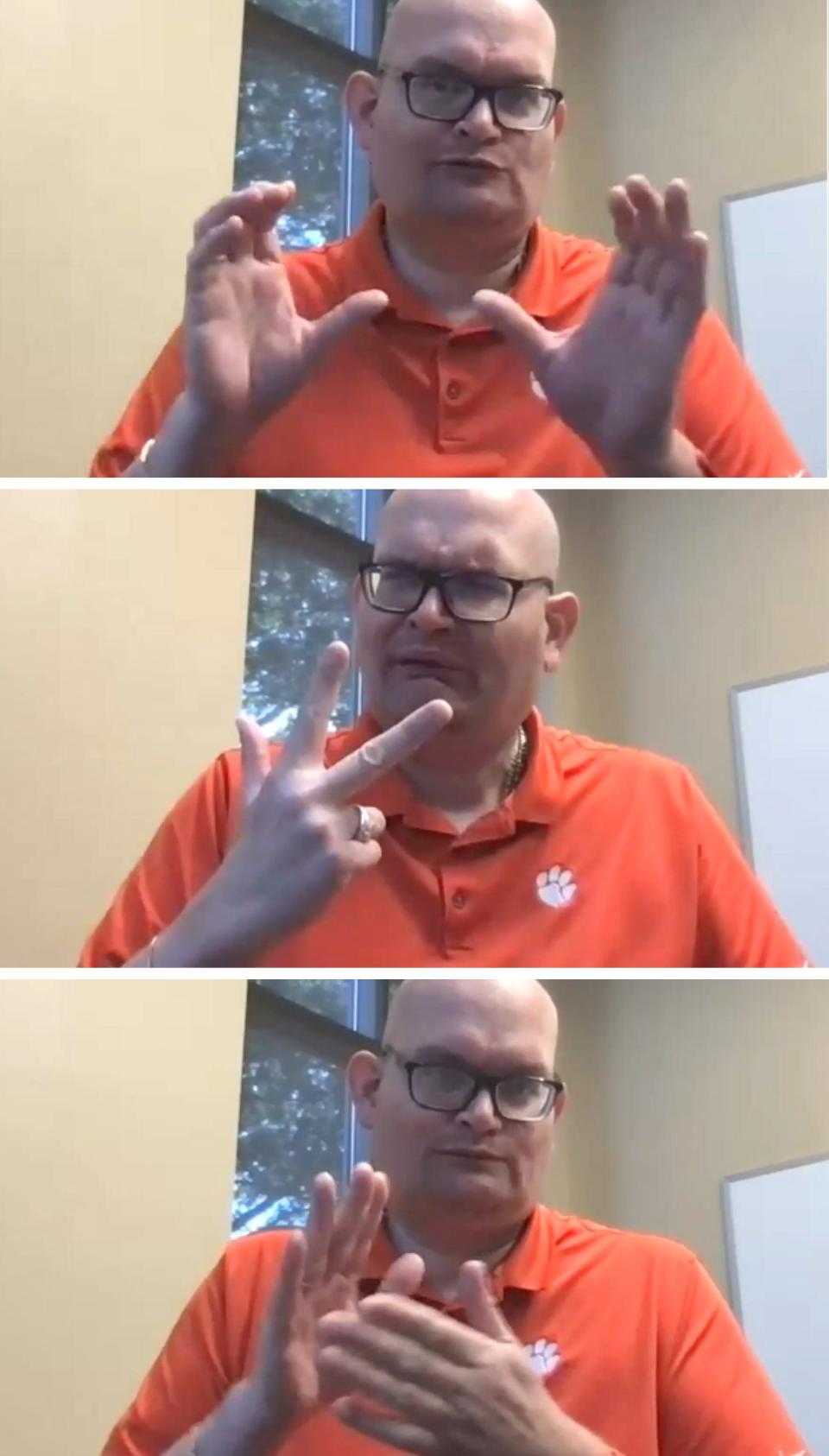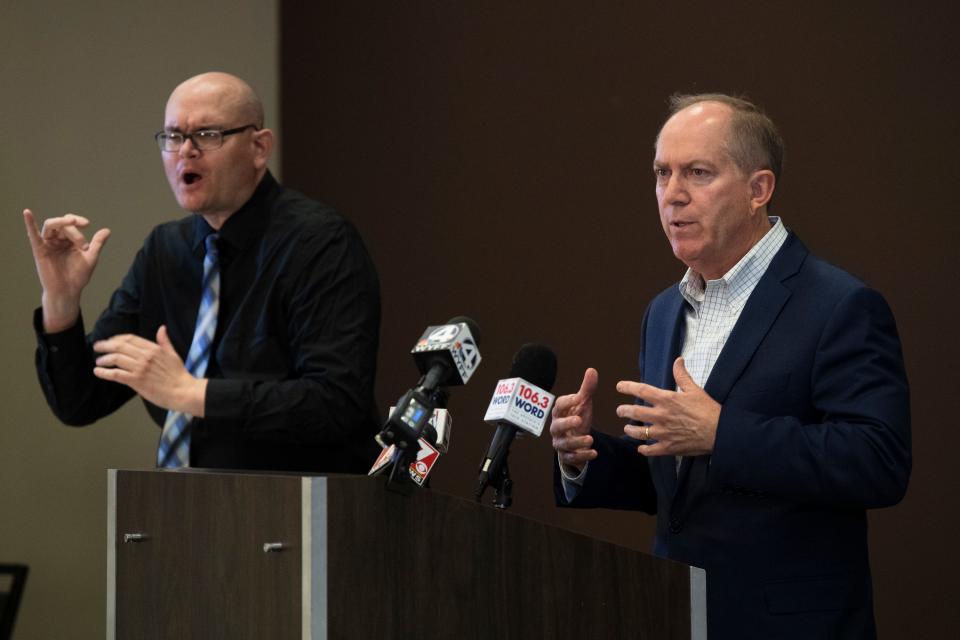'Celebrity has its advantages.' Certified deaf interpreter known for work with Nikki Haley
- Oops!Something went wrong.Please try again later.
It was an experiment, just to see how much interest there would be. There was a lot.
Jason Hurdich really likes coffee. He is also deaf, which makes ordering his favorites a challenge at times -- unless an employee knows American Sign Language (ASL).
At the Starbucks on Laurens Road in Greenville, several of the baristas do know ASL.
So when there was an opportunity to combine coffee and a gathering for the deaf community in Greenville and other parts of the Upstate, Hurdich and a colleague worked with Starbucks to host a Signing Starbucks Night.

“I thought, maybe we'll get, like, 30 or 40 people,” Hurdich said through an interpreter. “But the first time, we had over 300 people show up. Obviously, people are hungry to network.”
The coffee-fueled network drew people from North Carolina, Georgia and Tennessee and has flourished, despite being suspended like everything else during the pandemic. The monthly event is now in its fourth year, with the next gathering scheduled for Oct. 27.
Advocate and mentor for Deaf community
Hurdich lives in Greenville and is a full-time professor of ASL in Clemson University’s Language Department.
Clemson offers South Carolina’s only bachelor's degree program in ASL and has classes in ASL Studies and an educational interpreting minor. ASL is the second-most studied language at Clemson, after Spanish. Hurdich is one of five ASL professors at the school.
An accomplished, nationally recognized interpreter, Hurdich is also a powerful advocate and mentor for the Deaf community in Greenville and beyond.
“Communication is not just about words. It’s about emotions, context and culture,” he says.
Jason Hurdich selected as Greenville News Community Hero
For his work to bring an understanding of deaf culture and his dedication to improving the inclusion of deaf individuals into the greater Greenville community, Jason Hurdich has been selected as a Greenville News Community Hero.
The Community Hero program, sponsored by the Greenville Federal Credit Union, recognizes generous, committed work by those among us who make our community a better place.
Deaf since his birth in Queens, New York, Hurdich attended the Lexington School for the Deaf in New York and then Boston University, where he graduated with a degree in political science. He began teaching classes in ASL while he was still an undergraduate.
“I had planned to become a law student and that's why I majored in political science,” Hurdich said through an interpreter. "I was looking to go to law school. Later on, I shifted to teaching, but political science helps me understand how government works and helps me advocate.”
He earned a master of education degree in signed language interpretation from the University of North Florida and has been an ASL instructor at colleges and universities in Florida, Alabama, Kentucky, New York, Massachusetts and California.
Only certified deaf interpreter in SC
Hurdich is one of just a handful of certified deaf interpreters (CDI) in the South and the only one in South Carolina. The CDI credential is awarded by the Registry of Interpreters for the Deaf, Inc. (RID), the only national accreditation body for sign language interpreters in the United States. Hurdich also serves as secretary of the RID board of directors.
He’s worked in the private sector on technology projects to help deaf people communicate with each other and navigate in the hearing world.
Hurdich moved to South Carolina in 2016 to be a counselor for the South Carolina Vocational Rehabilitation Department (SCVRD). A year later, he joined the faculty at Clemson as an instructor of American Sign Language.
Soon after his arrival in Charleston, he gained fame across the state and nationwide for his expressive, animated interpreting of Gov. Nikki Haley’s emergency preparedness briefings on Hurricane Matthew.
Hurdich also interpreted for the City of Greenville's briefings during the first stages of response to the pandemic in March and April of 2020.
As a CDI, Hurdich brought a new level of skill to delivering potentially life-saving information to deaf and hard-of-hearing South Carolinians.
Emergency briefings: Nikki Haley called Hurdich 'a rockstar'
For his work during the emergency, Haley called Hurdich “a rockstar.”
Hurdich says he believes some of the popularity stemmed from the fact that deaf interpreters work differently, using facial expressions to communicate nuance and grammatical structure, not to be more entertaining.
“I mean, some people think the facial expressions are being funny,” he says. “They're not. It's a big part of our language. Facial expressions are the same as your vocal inflection.”

Even now, years later, Hurdich says every once in a while someone recognizes him from those briefings and wants to take a photo.
“Celebrity has its advantages,” he says with a bit of a shrug. “I was just doing my job, that’s how I view it.”
Hurdich has also become well known for his video clips on social media that offer viewers perspective on life as a deaf person, navigating daily life, interacting with hearing people … and frequently ordering coffee.
Signing employees and video technology has spread to more businesses, but there is much more work to be done, he says.
Sign language helps Clemson player: Sign language helps Clemson player communicate on basketball court
To that end, a new state law, the South Carolina Sign Language Interpreters Act, goes into effect on Jan. 1, 2024, requiring nationally certified interpreters to be available at hospitals and health care facilities, public higher educational institutions, police stations and many other state agencies in South Carolina.
“Just like the doctor is required to have a license and nurses are required to have a license,” Hurdich says. “When there's an incorrect interpretation of what a doctor says, this may cause harm, just like a doctor could potentially indirectly cause harm.”
The interpreting requirement means that there is an ever-increasing need for more certified interpreters, both hearing and Deaf. Interpreting is a skill that goes beyond fluency in ASL.
“To learn to interpret is cumbersome,” Hurdich says. “It takes a lot of training, a lot of deliberate practice and a lot of hands-on learning. It takes quite a bit of time. It took me a long time to get where I needed to be as an interpreter.
Mediating between cultures
An important part of interpreting is learning how to mediate between different cultures, being able to understand how deaf people navigate the world and how to communicate meaning and context rather than simply translate from English words to ASL signs and fingerspelling.
That requires a mindset change for many hearing people, especially in America, Hurdich says.
“What people don't realize about the deaf community is we are collectivist. We're very caring and supportive of one another,” he says. “You know, 70% of the world has a culture like that, they're family-oriented. American culture is not. We're very individualistic, very proud of what we can do individually.”
Hurdich says part of his goal is to "get this message out for hearing people to know. Deaf people are cool, you know. We're part of the community. Part of the whole Greenville community and Greenville is a beautiful community.”
This article originally appeared on Herald-Journal: Clemson ASL professor works to connect deaf, hearing worlds

